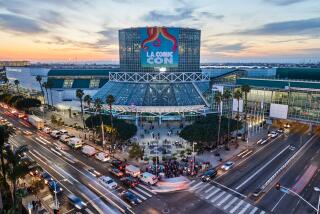Adventure Capitalists : Publishing: After inking strategic deals, Malibu Comics has become a leader in the world of mutants and super-heroes.
Thanks to some hip new super-heroes with MTV-style wardrobes, Malibu Comics Entertainment Inc. in Westlake Village is turning the comic book industry on its head.
Founded in 1986 by comic buff Scott Rosenberg, Malibu had by last year edged its way into the top five comic book publishers nationwide. Then in February, a group of popular young artists who penned such hits as X-Men and Spider-Man for giant Marvel Entertainment Group Inc. left Marvel after a dispute over their share of profits and creative control. After a critical article in Barron’s revealed the artists’ exodus, Marvel’s stock plunged $11.375, losing $138 million in market value in one day’s trading.
The seven artists formed their own label, Image Comics, then struck an unprecedented deal with Malibu that gave the artists full ownership of all characters they create, while Malibu publishes their material. In August the Image titles accounted for about 90% of Malibu’s total billings, said Milton Griepp, president of Capital Distributors, a comic book distributor based in Madison, Wis. Some of the Image books--such as Youngblood, Spawn and WildC.A.T.S--have been among the nation’s best-selling comics in recent months.
The Image comics have boosted Malibu’s overall sales and helped it shoot to No. 3 in the industry. Comics published by Malibu are expected to account for 10% to 12% of U. S. sales to comic book stores for 1992, according to Internal Correspondence, a newsletter published by Capital Distributors.
Only Marvel, with 50% of the market, and Time Warner Inc.’s DC Comics, with 18%, remains ahead of Malibu. But Rosenberg, an energetic 30-year-old, likens Malibu to the upstart network that proved that the Big Three weren’t invincible: “We’re kind of like the Fox of comics.”
Certainly the two industry leaders must have been unnerved in August, when Malibu temporarily occupied the No. 2 spot with 18% of total sales to comic book stores, while DC slipped to 17%. Malibu, whose annual revenues Rosenberg puts at more than $10 million, has since fallen back to third. But never before had a company infiltrated Marvel and DC’s decades-long lock on the top.
It isn’t hard to figure out the appeal of Image Comics to the core audience of 12- to 18-year-olds. Image features super-heroes saving the world--no surprise there--but that’s where their resemblance to Superman ends. Many characters are mutants or genetically altered beings with dark pasts. They wear spikes and chains, work for secret government task forces and carry futuristic weapons.
“It’s garish, it’s exciting, the kind of thing a kid looks at and says it’s awesome,” said Don Thompson, co-editor of Comics Buyer’s Guide in Iola, Wis.
True, Malibu’s profit margin on Image is no doubt narrower than it would be if Malibu owned the characters, and Malibu won’t get a cut from licensing deals Image artists make with movie, TV or toy companies. But Thompson said the deal has only helped the firm.
“Malibu does get profit,” Thompson said, “and whatever it is, it’s more than they were getting before. Also, their other titles are doing better, and they’re attracting better people to work for them.”
Officials at Marvel, which is 60% owned by billionaire Ronald O. Perelman, didn’t return phone calls. But Paul
Levitz, DC’s executive vice president and publisher, said, “We felt for years there’s room in our business for more successful publishers.”
Malibu’s challenge now is to build a company that can stand on its own without Image. After all, said Bill Liebowitz, owner of the Golden Apple Comics retail chain
in Los Angeles, “the long-term staying power of these characters has yet to be proved.”
Rosenberg said he’s not taking anything for granted. He’s hoping to build a “full-service, multimedia company” that will generate more comics in-house, develop video games based on Malibu-owned characters and license its characters to Hollywood.
Just how the privately held Malibu will pay for this expansion isn’t clear, and Rosenberg won’t discuss the company’s finances. The comic book world is fickle, and if the company goes heavily into debt and its plans don’t pay off, Malibu could be in big trouble.
Nonetheless, Rosenberg is plowing ahead. In August, Malibu merged with video game developer Acme Interactive (now called Malibu Interactive), also in Westlake Village. “We think we can feed off each other,” said Acme Interactive founder Bob Jacob.
Sega of America Inc. is introducing an “Ex-Mutant” video game in December based on Malibu’s first comic series, about a pack of super-heroes protecting the world after a nuclear holocaust. Another Malibu title, Dinosaurs for Hire, has also been licensed for a Sega game due out by March.
As part of the merger deal, Jacob was given half ownership of Malibu Comics Entertainment and shares the title of president with Rosenberg.
Before Image, Malibu did have its own successes. The sales of Ex-Mutants were strong, and the company is restarting the series after a two-year hiatus. Ninja High School, which chronicles the exploits of teen-age ninjas and aliens in a Midwest town, is another popular title, and sales are going well for Malibu’s new Protectors, about outlaw super-heroes in Washington, D.C.
The company has also made a mark resurrecting classic characters by buying licenses for such titles as I Love Lucy and Tarzan--although Malibu often puts a twist on an old idea, by having Sherlock Holmes meet Dracula, for instance. It also publishes some titles in 3-D, selling them with special glasses.
To build up Malibu’s internally generated material, Rosenberg is expanding the company’s in-house art staff as well as striking deals with new independent artists.
The company has also invested in film-output and computer-coloring systems. Most publishers subcontract film and coloring work, but Rosenberg believes the technology gives Malibu better quality and saves time. For instance, instead of painting over the lettering in word balloons by hand to add a foreign language for overseas sales, the task can be done quickly on the computer.
The company has also inked a distribution agreement with Time Warner that will put its books in supermarkets, convenience stores, mass-merchant chains and newsstands. These retail outlets account for about 20% of comic book sales, but they tend to avoid smaller publishers. A push into foreign markets is also on the agenda.
Meanwhile, Malibu is aggressively marketing its comic book characters to Hollywood, and is being represented by talent agency International Creative Management. So far, Fox has licensed Dinosaurs for Hire for a possible animated show, and another Malibu title about a band of rogue CIA-type operatives called Men in Black is being considered by Columbia Pictures for a feature film. A Protectors toy line is due out by Christmas.
For Rosenberg, Malibu is an extension of a childhood passion.
At 13, the Beverly Hills native was trading and selling comic books at local conventions. After graduating from the University of Denver in 1985 with a degree in management and marketing, Rosenberg began distributing comic books. The following year, an editor and a group of artists asked him to help publish a new comic. Malibu was born, and Ex-Mutants was put together for about $12,000.
In 1987, the bottom fell out of the comic book market, a result of a product glut on store shelves. Rosenberg began selling his own collection and raised about $200,000, he said, to keep the company going. By 1988, Malibu began to take off again, and now its books are in virtually every comic book store in the country.
Malibu publishes 20 titles a month, most retailing for $1.95 to $2.95. It has a dozen series, and it also publishes miniseries and one-time specials, such as one comic that concluded the Fox TV show “Alien Nation,” which was canceled after a season-ending cliffhanger. Malibu also publishes larger-format graphic novels.
But for now, it’s the Image comics that have put Malibu into the spotlight.
Image artists Rob Liefeld (Youngblood), Todd McFarlane (Spawn) and Jim Lee (WildC.A.T.S) are idolized like rock stars. Liefeld has appeared in a Levi’s commercial with Spike Lee and has been a guest on “The Dennis Miller Show.”
Some rivals suggest the popularity of Image may be fleeting. After all, the violent, in-your-face style might not sit well with some parents.
“There’s nothing funny about ripping a guy’s heart out,” complained Michael Silberkleit, chairman and publisher of Archie Comic Publications Inc.
But during one of Lee’s book signings at Golden Apple in August, more than 2,000 fans and collectors showed up, and police had to tame the crowd. At a signing by McFarlane, Lee was mobbed as he got out of his car. He jumped back in and drove around the block so he could slip in the back way.
And last Thursday, comic fans John Hyun and Reese Goldman, both 14, started waiting outside Golden Apple on Melrose Avenue at 4 a.m. to get autographed copies of the new CyberForce by Image artist Marc Silvestri. When they finally got their comics at 7:30 p.m., the pair chimed, “Excellent!” Malibu, no doubt, agrees.
More to Read
The biggest entertainment stories
Get our big stories about Hollywood, film, television, music, arts, culture and more right in your inbox as soon as they publish.
You may occasionally receive promotional content from the Los Angeles Times.











